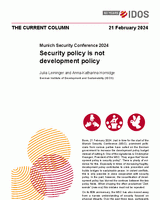Munich Security Conference 2024
Security policy is not development policy
Leininger, Julia / Anna-Katharina HornidgeThe Current Column (2024)
Bonn: German Institute of Development and Sustainability (IDOS), The Current Column of 21 February 2024
Bonn, 21 February 2024. Just in time for the start of the Munich Security Conference (MSC), prominent politicians from various parties have called on the German government to increase the development policy budget instead of cutting it. One of the signatories is Christopher Heusgen, President of the MSC. They argue that "development policy is security policy". There is plenty of evidence for this. Especially in times of increasing fragility, development policy contributes to crisis prevention and builds bridges to sustainable peace. In violent conflicts, this is only possible in close cooperation with security policy. In the past, however, the securitisation of development policy has blurred the contours between the two policy fields. When shaping the often proclaimed “Zeitwende” (new era) this mistake must not be repeated.
On its 60th anniversary, the MSC has also moved away from a narrow understanding of security focused on physical integrity. Over the past three days, participants have discussed fundamental questions of human security - from military armament and NATO to climate change and economic relations. In its report, the MSC describes a precarious starting point for this broad debate. The global order is out of balance because the advantages of international cooperation are no longer recognised and the principle of rivalry increasingly prevails. Only global, reciprocal partnerships can help to stop the impending lose-lose dynamic. Security policy, and even less defence policy, cannot achieve this alone.
The wide-ranging discussions in Munich could lead one to believe that development and security policy follow similar logics. On closer inspection, however, it becomes clear that development policy can be security policy for sustainable peace, but security policy is not development policy. Such a reverse conclusion would not only be wrong, but also dangerous. Why? Although both policy fields claim to contribute to human security, their instruments - which should ideally be interlinked - and effects are very different. Security policy is directed against (potential) threats to human life and is intended to protect it from attacks. Physical security is a basis for sustainable development. In this respect, security policy can be an important condition for development policy action, especially in war and zones of terrorism. However, it always works with a logic of defence. International security policy alliances form alliances for the protection of human integrity against (potential) aggressors. This can close doors for global partnerships, which are currently so urgently needed to tackle sustainability transformations and contain the loose-lose scenario outlined by the MSC.
And this is where development policy comes into play. Struggling with great perseverance to find ways and formats for reciprocal and constructive cooperation is the DNA of development policy action. The underlying logic is cooperation in order to overcome the evils of humanity that demonstrably provide fertile ground for insecurity - poverty, unemployment or a lack of future prospects. In this sense, development policy is also "sustainable security policy". It presupposes that development policy is designed to be long-term and structure-building in order to shape transformation processes peacefully together. This is only possible through cooperation that is committed to common visions for the future. In this way, development policy also takes on the role of keeping doors open and building bridges where security policy has to keep doors closed.
Development policy is not the "little sister" of security policy - although this is a popular portrayal. Even the MSC, the cradle of security policy debates, now emphasises that long-term, reciprocal partnerships between the - as the MSC 2024 report puts it - "so-called Global South" and "Global North" are central to human security. Development policy issues have thus reached the core of security policy debates. This does not appear to be new, considering the debates on networked security in the Afghanistan mission, for example. What is new, however, is that global politics has changed in such a way that the circle of those who ultimately co-decide on security has expanded.
Both policy areas are therefore facing major challenges and reforms. They are shaken by eroding rules and rivalries in the international order. Low- and middle-income countries in Africa, Asia and Latin America are diversifying their relations and becoming more self-confident. "Partnership at eye level", which development policy has repeatedly endeavoured to achieve over the years, is now being demanded with new vehemence by its partners. Security alliances such as NATO, which were thought to be stable, are increasingly faltering.
In order to ensure human security and integrity, we need both development policy for viable global cooperation to shape sustainable futures and security policy alliances against aggressors where cooperation reaches its limits. A reform of the interplay of foreign policy fields would make it possible to shape the “new era” comprehensively instead of primarily militarily. A first step in this direction is the joint recognition of global problems. This is described in Germany’s first and recent National Security Strategy. Effective cooperation between development and security policy presupposes that the logics of action that define them are clearly recognisable. However, even after years of debates on networked security, the unique selling points and comparative advantages of the respective approaches remain unclear. Answers to these questions must now be found anew - also in the light of the evaluation of the Afghanistan mission. One thing is certain: a coherent interplay of different instruments must have a common goal: Peace and security.


